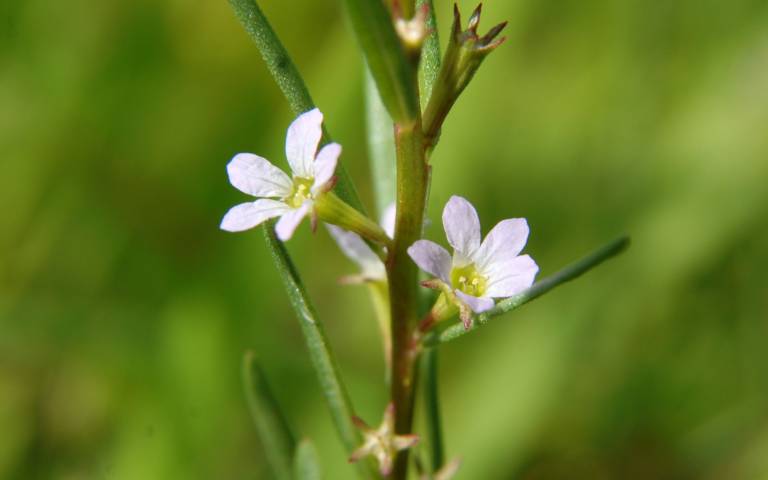Rare Grass-Poly rediscovered in Norfolk 'ghost pond'
30 November 2020
A rare and endangered UK wetland plant has been found in Norfolk after more than a century in hiding, report UCL researchers.

In July a survey team from UCL’s Department of Geography discovered the flowering plant, known as Grass-Poly, at a farmland pond restored by the Norfolk Ponds Project back in February 2020.
Pond restoration in Norfolk’s farmland has involved removing trees and mud from ponds that have been become overgrown through decades of neglect. This work brings the sunlight back into ponds, often called 'ghost ponds', and has been shown to have many positives for wildlife.
As well as benefitting amphibians, birds and pollinators, the restoration of farm ponds has also been found to help wetland plants through exposing seeds buried for centuries under a thick layer of leaf matter and mud. Remarkably, UCL research shows that many water-loving plants can come back from seeds that have been dormant for centuries in old ponds.
Just six plants of the rare Grass-Poly were found in July at the edge of an old cattle-watering pond on the Heydon estate in Norfolk, where restoration work involved pulling out large willows, resulting in disturbance of the wet soil.
Professor Carl Sayer of UCL’s Pond Restoration Research Group said: “I was out doing surveys and saw the plant at my last pond at the end of the day. I wasn’t certain what it was, so I sent a photograph to local expert botanist Dr Jo Parmenter of the Norfolk & Norwich Naturalists’ Society. To our mutual astonishment, she was able to confirm that the mystery plant was Grass-Poly, the first certain record of the species in Norfolk for over a century.”
Grass-Poly (Lythrum hyssopifolia) is a very rare plant listed in Schedule 8 of the British Wildlife and Countryside Act and has been endangered for some time. The last confirmed record for it in Norfolk is for early 1900s.
Professor Sayer added: “There can be no doubt that it was our restoration work that has brought Grass-Poly back into the land of the living from old buried seeds. I could not be more thrilled to see this species come back to us in Norfolk.”
Grass-Poly is a delicate plant in the Loosestrife family which produces neat pinkish flowers and when found in abundance it can turn a wetland pink. It is a highly specialised plant, thought to have arrived in the UK more than 1,000 years ago. It often grows in moist habitat, such as marshes, clay soils and wet agricultural fields.
Dr Parmenter commented: “This is a species of bare mud and disturbed wet ground that is flooded in winter, but which dries out in spring. These special habitat requirements undoubtedly explain the rarity of Grass-Poly, as the combination of wetland soil disturbance and sufficient water level fluctuation are uncommon in modern-day farmland. In East Anglia the removal of horse power from farms, reduced cattle numbers and the scrubbing over of farm ponds are likely contributors to its decline.”
The team are determined to keep Grass-Poly in Norfolk, as UCL researcher Helen Greaves reveals: “As regular disturbance is needed for the survival of Grass-Poly, we have been thinking about how we can maintain our population. We might need to carry out regular winter raking or introduce some cows or maybe a Christmas pantomime horse would suffice if we get stuck! Whatever the method, we are desperately keen to keep the plant alive now it has come back to us.
“We wonder if there are other populations of the plant in Norfolk that have so far been overlooked. Could further pond restorations bring back more plants? Either way, finding this elegant little plant may provide an important and unexpected new focus for our Norfolk Ponds Project.”
Partly funded by Natural England’s District level licensing for great crested newts scheme, the National Trust’s Riverlands project and the Upper Wensum Cluster Farm Group, the Norfolk Ponds Project, completed more than 70 pond restorations across East Anglia between autumn 2019 and early 2020 as part of its Big50 project
Working with Natural England and the Freshwater Habitats Trust, the UCL team will soon be publishing a new guide to pond restoration, creation and management, which aims to help landowners and agricultural land managers to better conserve farmland ponds for the benefit of wetland wildlife.
Links
- UCL Geography
- Professor Carl Sayer’s academic profile
- UCL researcher Helen Greaves’ academic profile
- Norfolk Ponds Project: The Big 50
- Norfolk and Norwich Naturalists’ Society
- Natural England
- Freshwater Habitats Trust
Image
- A Grass-poly plant found in Norfolk, credit Rob Peacock
Media Contact
Jane Bolger
Tel: +44 (0)7713 261 477
Email: j.bolger[at] ucl.ac.uk
 Close
Close

